|
In Advent, we are asked to keep two themes of the season in mind: the birth of the Christ child and preparation for his arrival to Earth again to end time. These great events, that of God descending in human form to Earth to save us from our sins by his death and resurrection, and the end of time with his arrival through the second coming, are powerful and mystical events. I often forget to focus my thoughts on this period from just before Thanksgiving until just before Christmas begins. One way over recent years that has helped me remember this awe-inspiring season of hope and repentance is through listening to one of my favorite Advent hymns: Let All Mortal Flesh Keep Silence. As a brief refresher, it is a song whose lyrics are based on the Divine Liturgy of St. James and has been used as a hymn in Greek since around the third or fourth century. Speaking about the awesome power of Christ and his gift to us through the Eucharist in vanquishing the powers of hell and bringing eternal light, this hymn was revitalized during the Oxford Movement of the 19th Century and adapted to English. For Catholics, we believe in the Real Presence, so our understanding and awe hopefully go much deeper when sung with lyrics such as: “King of kings, yet born of Mary, As of old on earth He stood, Lord of lords, in human vesture, In the body and the blood; He will give to all the faithful His own self for heav'nly food.” For me, this song about Christ Jesus descending and giving of his own life and blood for us – simply because he loves us – is a powerful and calming reminder of what Advent is really about. It is not just about Christmas, and the gift giving, or even just the celebration of Christ’s birth. His birth is not what saved humanity. It was his sacrificial death and gift of the Eucharist that provides us that opportunity to join him in heaven for eternity as fulfillment of the covenant between God and his people. In a season with some of the darkest and coldest days for us in America, a song like this helps us remember that even in our darkest moments, Christ is there as a hopeful light. While the season of Advent is wrapping up, I invite you to take a few moments during your busy season to reflect on the power and awesome love of God’s gift to us, and the preparations we need to make for his return.
0 Comments
On November second every year, we celebrate the Feast of All Souls’ Day. It is a day when we are meant to remember and pray fervently for the souls of those who have gone before us marked with the sign of faith, especially our loved ones. While it isn’t a holy day of obligation, it is a beautiful opportunity to go to Mass if you are able. At Mass on All Souls’ Day, there’s a chance you might hear special music that you’re not used to hearing every Sunday. The reason for this is that there is a long and storied tradition of praying for the repose of souls in our music. This dates back to the very beginnings of Gregorian chant hundreds and hundreds of years ago. The sheer volume of work dedicated to this subject shows us the importance of the day and the importance of praying for our dead and remembering them always. Going back all the way to the beginning, we look to the simple chants sung at requiem Masses (Masses for the dead) that have implanted themselves in the musical tradition of All Souls’ Day. For instance, you might be familiar with the beautiful chant “In Paradisum,” the text of which is sung at every funeral, in which we ask for eternal rest in paradise for the deceased, entrusting them to the angels to take them to the bosom of Abraham. There are many different versions of this chant, from very modern to traditional and choral. The same goes for the other requiem texts, the “Dies Irae” being another. Moving forward in history, we see some of the greatest composers creating masterworks called “requiems.” In these, the special prayers for Masses for the dead mentioned above as well as the prayers that are sung at ordinary Masses (like the “Kyrie”) are set to music. Usually they were written for choir as well as orchestra or organ, some requiring hundreds of musicians. Some of the most famous requiems are Mozart’s, Verdi’s, and Fauré’s. You may hear selections of these at All Souls’ Day Masses, or at special concerts dedicated to the feast, or during the season of Lent. Listening to recordings of them is also a wonderful supplement to your prayers during this time. One of the most famous pieces of music within the tradition of All Souls’ Day is the “Pie Jesu.” Again originating from the prayers of the Mass for the Dead, the text reads, “Pious Lord Jesus, give them rest. Pious Lord Jesus, give them everlasting rest.” This prayer has become one of the most frequent inspirations for performances and composers, as the prayer itself is so simple and beautiful. There are so many beautiful versions, including one—among the most popular—composed by Andrew Lloyd Weber, the composer of The Phantom of the Opera. Whatever your taste in sacred music, there is much to be gleaned from the vast stores of music history with regard to All Souls’ Day. For a thousand years, composers have taken to the page to help us better pray for our deceased loved ones. This year, why not find a requiem that you haven’t heard before, or listen to Andrew Lloyd Weber’s “Pie Jesu”? Ask God to help you to pray for the souls of your loved ones through this music as millions of people have done before you and will continue to do as long as music lives. **This blog was originally published on November 2, 2022.** On November second every year, we celebrate the Feast of All Souls’ Day. It is a day when we are meant to remember and pray fervently for the souls of those who have gone before us marked with the sign of faith, especially our loved ones. While it isn’t a holy day of obligation, it is a beautiful opportunity to go to Mass if you are able. At Mass on All Souls’ Day, there’s a chance you might hear special music that you’re not used to hearing every Sunday. The reason for this is that there is a long and storied tradition of praying for the repose of souls in our music. This dates back to the very beginnings of Gregorian chant hundreds and hundreds of years ago. The sheer volume of work dedicated to this subject shows us the importance of the day and the importance of praying for our dead and remembering them always. Going back all the way to the beginning, we look to the simple chants sung at requiem Masses (Masses for the dead) that have implanted themselves in the musical tradition of All Souls’ Day. For instance, you might be familiar with the beautiful chant “In Paradisum,” the text of which is sung at every funeral, in which we ask for eternal rest in paradise for the deceased, entrusting them to the angels to take them to the bosom of Abraham. There are many different versions of this chant, from very modern to traditional and choral. The same goes for the other requiem texts, the “Dies Irae” being another. Moving forward in history, we see some of the greatest composers creating masterworks called “requiems.” In these, the special prayers for Masses for the dead mentioned above as well as the prayers that are sung at ordinary Masses (like the “Kyrie”) are set to music. Usually they were written for choir as well as orchestra or organ, some requiring hundreds of musicians. Some of the most famous requiems are Mozart’s, Verdi’s, and Fauré’s. You may hear selections of these at All Souls’ Day Masses, or at special concerts dedicated to the feast, or during the season of Lent. Listening to recordings of them is also a wonderful supplement to your prayers during this time. One of the most famous pieces of music within the tradition of All Souls’ Day is the “Pie Jesu.” Again originating from the prayers of the Mass for the Dead, the text reads, “Pious Lord Jesus, give them rest. Pious Lord Jesus, give them everlasting rest.” This prayer has become one of the most frequent inspirations for performances and composers, as the prayer itself is so simple and beautiful. There are so many beautiful versions, including one—among the most popular—composed by Andrew Lloyd Weber, the composer of The Phantom of the Opera. Whatever your taste in sacred music, there is much to be gleaned from the vast stores of music history with regard to All Souls’ Day. For a thousand years, composers have taken to the page to help us better pray for our deceased loved ones. This year, why not find a requiem that you haven’t heard before, or listen to Andrew Lloyd Weber’s “Pie Jesu”? Ask God to help you to pray for the souls of your loved ones through this music as millions of people have done before you and will continue to do as long as music lives.
As I write this, my laptop is balanced precariously on my knees because there is no longer space on my lap. My baby girl presses into my belly button with each hiccup, and I can’t help but think about her arrival. In the next three weeks, I will feel her hiccups against me from the outside. I will know her hair color and her features and I will breathe in her perfect newborn scent. Until then, I cherish the last days of my two-year-old being the baby, of my family being one of six instead of seven, and the time I have to prepare for her to enter the world.
First time mothers and mothers of many can easily relay their baby preparedness to-do lists: rinse the onesies, install the carseat, visit the doctor again. Physically and mentally, we work to be ready to welcome the sweet new life we created. I’m embarrassed to admit that I did not make plans around my spiritual readiness for a newborn until the birth of my fourth child. In all of my business preparing my mind and body for labor and delivery, God’s role in this life-event has been a mere afterthought. Confessing this to other mothers and mothers-to-be has revealed that I am not alone in this oversight. Being consumed by the physicality of what is happening to our bodies can edge out any focus on what is happening to our spirit. This time, I’m changing that. Through Seeking-Truth In Jesus Calling: Enjoying Peace in His Presence, Sarah Young writes, “When you seek My face, put aside thoughts of everything else. I am above all, and in all; your communion with Me transcends both time and circumstances. Be prepared to be blessed bountifully by My Presence, for I am a God of unlimited abundance.” The process of labor, delivery, and early mothering is one of humility. I deeply desire a window into the future so I can know and prepare for the date and time this baby will come, how delivery will go, and what the outcome will be. Of course, these are things I cannot know. By seeking Truth in His face, in the Word, and in the sacraments, I am invited to rest in the peace of what I do know: my baby and I are seen and known by the God of abundance. He alone knows what is to come, and His plan for me is good. Through Worship This truth leaves me in awe of our God, and I cannot help but to praise Him. My favorite form of worship is music, and I want to bring that into the delivery room. With each contraction, I can lose myself to the words celebrating His presence in the pain. It reminds me of His strength when I feel that I have come to the end of my own. Words of praise will be some of the first my baby hears. My labor playlist is available for you here. Through Prayer One of the many gifts of prayer is its communal nature. This has been a beautiful way to invite those we love into the process of preparing for the birth of our baby, and even into the delivery room. This pregnancy, we have invited our loved ones to pray a novena leading up to the baby’s due date. Our child’s godparents alongside many of the friends who witnessed our wedding, and vowed to help uphold us in our vocation to family life, will join us in the novena to Saint Mary Magdalene, praying for the safe delivery of our baby. (It starts today-- join us!) Other favorite prayers leading up to labor and delivery include: -St. Gerard Majella Novena for Expectant Mothers -Novena to Mary, Mother of God -Prayer for the Birth of a Child We invite our friends to pray for us, but we also invite them to offer their intentions so that we might pray for them. As Catholics, many of us are familiar with the phrase "offer it up." This means that we can enter into the redemptive suffering of Christ when we "offer up" our own suffering, work, or joy. The Catechism says, “The cross is the unique sacrifice of Christ, the ‘one mediator between God and men’ [1 Timothy 2:5]. But because in his incarnate divine person he has in some way united himself to every man, ‘the possibility of being made partners, in a way known to God, in the paschal mystery’ is offered to all men (618).” It is my hope to offer up the pain of childbirth for the cares and concerns of the people we love the most so we ask: How can I "offer up" the end of this pregnancy and my labor for you? Preparing my heart to walk alongside Jesus through the last days of pregnancy, childbirth, and recovery is the most important preparation I can make. Together with my Heavenly Father, the onesies will be cleaned and the hospital bag packed. In His presence, this child will come into the world with praise. My life and hers, our being, our all, are in Him and with Him, and for Him. And so, Amen. For more resources on Marriage and Family, please click here.
I think there is something special about a cover—about taking a song, a painting, or a movie and recreating it within the modern frame of mind. Aretha Franklin’s bold and unapologetic “Respect” is a perfect example, as she interprets the song as a Black woman in the 1960’s. As is Jimi Hendrix’s “All Along the Watchtower,” in which he narrates the song with hauntingly beautiful guitar riffs. In visual art, Andy Warhol recreates the portrait of Mao Zedong with a messy array of bright colors—an unusual depiction of the dictator. Finally, modern movies, headlined by the Cohen Brothers’ True Grit, give life to old characters and stories, recreating them for new audiences. However, even the Beatles, the most covered band of all time, cannot compete with the millions of interpretations of Jesus Christ. Thousands of artists have painted Christ crucified or the Madonna and Child. Everyone from Van Gogh, Basquiat, or da Vinci have painted Jesus Christ, each in their own manner. It can be mind-numbing to try to flip through them all, viewing each painting, alien to the others, and, oftentimes, to us. There are always two questions to ask when discussing art: “What is this artist trying to say?” and “What do we think he or she is trying to say?” These questions matter much more when investigating faith. In a special way, how artists of all disciplines—including sculptors, writers, or directors—interpret Jesus will affect us. Every Catholic, no doubt, thinks of Jesus through some piece of art or another, but Jesus is more than just a collection of paints, words, or images. Jesus is alive. It is tempting to trap Him in a Caravaggio, an El Greco, or even in the Passion of the Christ—to prevent Him from challenging us. Jesus as represented in art cannot call us out in our sins; He cannot tell us the hard truths we need to wrestle with. Even further, we should not trap Jesus in the Church or solely in the Mass. Yes, we are oftentimes challenged in specific ways during the Mass, especially when a priest gives a difficult homily. It can be easy, however, to selectively hear the priest, interpreting him and hearing only what we want to hear. We often want a sanitized Jesus, one that affirms us and makes us feel good. But while Jesus resides in the tabernacle and comes to meet us in every celebration of the Eucharist, He cannot be left there. Jesus wants to encounter us personally in order for us to help others encounter Him. Jesus always challenged His disciples to worship, act, and believe in accordance with truth. Jesus was not “sanitized” or acting in the “proper way” when He overturned the tables of the money changers; He was not “sanitized” when He described the narrow way; and He surely was not clean and tidy when He died on the Cross. Jesus defied our expectations. He was filled with passion for God’s truth. While He is Beauty itself, Jesus often made His listeners look away as they were unable to embrace the unsavory truth that can be hard to swallow. I enjoy going to Washington’s National Gallery of Art or New York’s MET, but next time I see Christ there, I will be reminded that He is not trapped in the golden walls of the frame. Jesus is alive, living in the Eucharist and in others. While it is beautiful to witness Jesus in the arts, we must remember that Christ lives in the audience, the museum goers. While the beauty of the art itself is mesmerizing, Christ is alive in flesh, both on the altar and in people who remind us that, while beautiful, Christ’s message is a challenge.
Lent is the perfect time each year to do a personal assessment of our relationship with Jesus – to see if we are walking the path to sainthood as we are called. God calls each of us to become saints and it is imperative that we evaluate our spirituality, our actions, and our goals. This year I have been using three specific resources to aid in my self-reflection and in resetting my focus. Fr. Thomas Dubay’s Happy Are You Poor, Matthew Kelly’s I Heard God Laugh, and the music of Danielle Rose are helping me with my grand reset.
During this beautiful time of Lent, my individual assessment of my growth in holiness is both difficult and reassuring. In reflection, I am reminded that I am here to live out the Beatitudes – not to have memorized them, but to daily use the opportunities in my station in life to live them out. God also reveals to me that I am not to be like my favorite saints, but to become a saint by being authentically me, the unique person He created me to be. He also continues to enlighten me about deeper ways to communicate with Him in prayer. Little snippets in the morning give me focus to be the living sign of God’s love in the world I walk in. Then, throughout the day, I ask for help to physically live out the mission He has called me to. Simple little mantras such as: “Lord, help”, “Jesus, not my words and responses, but Yours”, “Jesus, Mary and Joseph give me strength and courage” are prayers I repeat throughout the day to help me remain in God’s will and not in my own. Growing in our Christian life is a continual moment by moment journey of self-discovery. The more we grow in love of Jesus, the better we come to know ourselves and the importance of our individual participation in His glorious mission in the world. I am struck by the essential commitment I must have to become who I was created to be, because that is how the presence of our Lord Jesus Christ is made known to those around us. “When you hung upon the cross looking at me, You didn’t die so I would try to be somebody else. You died so I could be the saint that is just me” is the refrain Danielle Rose sings that speaks of the magnitude of Jesus’ love for each of us and the intimate connection He desires with us. These little rituals and inspired guides keep me grounded as I live in the messiness of my humanity in this complicated world. Another aspect of my relationship with Jesus that I am examining comes from Happy Are You Poor. Fr. Dubay helps us to understand the things we are attached to, and why, and if these attachments are leading us deeper into the heart of Jesus or driving us away from Jesus. This is always a difficult process because I have to repeatedly admit to the things I am attached to that bring me temporary comfort and feed my selfish nature, and then I have ask for the grace to let go of these things I cling to so that Jesus can live in me. These practices in Lent are difficult, but not out of my reach. I attend daily Mass as frequently as possible and this communion builds the holy virtues to let go of my earth stuff, my temporal comforts, and to open myself to be God’s. At the beginning of each Mass, we recognize our fallenness and verbally repent and commit to do better. God’s love and mercy are always available to us so that we can change for the better. That is the assurance that keeps me striving. And in the quiet after receiving the Eucharist, I speak in my mind part of Psalm 95: “For You, O Lord, my soul in stillness waits, truly my hope is in You.” Matthew Kelly gives me such tangible and direct instruction to realign my life within God’s will. His emphasis on deepening our prayer life and then giving direct ways to accomplish this are worth reading and putting into practice. He speaks to us in the reality of our busy, chaotic, and very full lives with a simpleness that I can relate with. His theology is completely understandable and therefore gives me assurance that I can put it into practice in my daily life. Lenten rituals cause us to be uncomfortable in our flesh (as Jesus was in the desert) so that we can be totally dependent on our God to lead us. This examination, this ‘coming clean,’ is a necessary element of our Christian journey. Receiving the Eucharist to nourish us and receiving absolution in the Sacrament of Reconciliation are the wonderful gifts we have to assist us in our closer walk with Jesus and in fulfilling the individual purpose of our lives. Finding scriptures to meditate upon and asking God to reveal what He wants us to do daily to lead us to deeper levels of intimacy with Christ. All of these are designed to enlighten us, to transform us, and to bring us to a more joyful celebration of the victory of Easter! So, my fellow comrades, embrace the work that this season of Lent provides so that we may all grow deeper in love with our Lord and He may live and move and breathe through us! “Lord make us turn to you, let us see your face that we may be saved.” -Psalm 80 Click here for more resources to accompany you this Lenten season. In high school we had a religion teacher, named Mr. Matthews, who used to tell us not to worry about memorizing anything from his class but these words: “Love God with your whole mind, heart, soul and strength. Love your neighbor as yourself.” He would say, “If you come back and see me twenty years from now, I’ll be happy if those words are all you remember.” Mr. Matthew’s motto was inspired of course by Matthew 22:34-40, which happens to be today’s Gospel reading for the [Optional] Memorial of Saint Louis of France. In this text, Jesus clarifies that love of God and love of neighbor are the two greatest commandments on which everything else depends. To put in another way – without love, we are nothing (1 Corinthians). The pandemic has shown just how much we need this love in our world. And while it may be challenging to connect with one another right now, there are still ways we can share love with others from wherever we happen to be. Three Small Ways of Loving God
Three Small Ways of Loving Neighbor
Remember also, we are called to “love your neighbor as yourself.” During this unique and challenging time, are you taking care of your own spiritual, emotional, and physical needs? If you aren’t sure, it may be worth spending some time today writing down a short list of ways you can practice healthy self-care. If you liked this article, be sure to check out “Living the Corporal and Spiritual Works of Mercy During COVID-19” and “Mental Health and Coronavirus.” Music and art can be some of the most comforting outlets the world has to offer in times of uncertainty. They can bring joy, nostalgia, and excitement while reminding us of the best parts of humanity. They point our eyes toward God, beauty itself. I’m a musician, as are many of my friends. We sing for liturgies, we teach, we perform, we write. While so much of the world gets to work from home, we’re stuck in a sort of limbo. Our talents, our professions, have been shelved because there’s no one to physically perform for. Back in March, when the majority of my engagements had been cancelled indefinitely, I put my music on a shelf. I sat on the couch in a self-pity party. I became stagnant. What was the point of growing in my skill while I was sitting in my house all day? It left me feeling very empty and unfulfilled. Singing for Mass, while it is my job, has also become integral to my spiritual life. When that went away, I struggled to cultivate my spiritual life. Without my work, I felt unseen. It made me think: if I were never able to perform again for others, would I still make music? My first thought was, “Yes!” After months of feeling invisible and unproductive, I started to see that these were lies. God gave me gifts, and He sees me. When I’m sitting at my piano in my house, God is watching me. He is cheering me on as I practice and struggle and doubt. I realized it wouldn’t matter if no one ever heard me again. As we are safely and carefully starting to get back to a sense of normal, I am learning to be grateful again for music and art more than ever. They bring us out of ourselves and our struggles and remind us that while things have been bad in the past and may be difficult in the future, there is still so much beauty and goodness present. Our God, pure beauty Itself, is present in all these things. Even though it might seem that creating art, like so many things, has been paused for the time being, it lives on in times of change and crisis. It is shaped and inspired by times like these and by the better, happier times to come. I cannot wait to sing for Mass again, to perform again, and to create with my friends and colleagues again. But in the meantime, I am comforted remembering that God hears me no matter what. He is still using me for His purpose every time I use my gifts for His glory. Even if it feels fruitless, let us always try to praise God by using our gifts -- God uses all things for good. Today we celebrate the 83rd birthday of our Holy Father, Pope Francis. We thank God for the gift of his life and pray for his continued health and leadership in our Church.
Having a birthday near the holidays must be pretty hard to bear as a child, and maybe even sometimes as an adult. Birthdays are meant to be celebrated, and sometimes they can be overshadowed by other holiday celebrations! My sister has a birthday on Christmas Day and she never seemed to be able to celebrate the same ways I could (my birthday is over the summer). I always felt bad and try to still make it special for her - even now that we are adults. Although we know Pope Francis for his humility and selflessness, I’m sure even he has found it hard to celebrate his special day from time to time. We celebrate birthdays as a way to mark our growing one year older, but I’m sure with a birthday so close to Christmas, his focus has often been on Christ. I would imagine, in his ministry, our pope has reflected on the significance of their birthdays being so close and how he can look to the purpose of the season over his own celebrating. Let’s also reflect on this now. How can we make Jesus’ birthday especially meaningful this year? In what ways can we strive to “celebrate” with Christ? What implications does Christmas have on my upcoming year as I continue to grow in my faith? “The reason for the season” is a common phrase we hear at this time of the year— a helpful little rhyme to keep us thinking about Jesus’ birth. The purpose of the Son of God coming to Earth was to save us all from our own sins, yet we so often confuse this time with shopping deals and stressful holiday travel plans. Our Lord doesn’t need any of that. He doesn’t need physical gifts—he needs our hearts. He doesn’t need perfection—he yearns for our humble, raw, and disheveled selves. He doesn’t need displays of lights and blow-up snowmen—he needs us to shine his light in the darkness. In order to celebrate his birth, we must first put aside the distractions and concerns that keep us away from prayer and peace at Christmas. The meaningful celebrating that we should be doing for Christ isn’t wrapped up with bows and shiny paper, but includes finding time to appreciate and pray about our Lord’s coming. The celebration for an ordinary person may be tied to cake, candles, and presents, but as Pope Francis would likely agree, celebrating Christ comes from the heart. One way I’ve found to celebrate Christ’s birthday amidst the hustle and bustle of the season is by listening to joyful, instrumental Advent and Christmas music. Something about it makes me feel so peaceful and filled with the joy of Christ that I almost prefer it to lyrical Christmas music on the radio or Spotify! Another practice I’ve found to be helpful is focusing on the giving aspect of Christmas. I feel better giving rather than getting things. My favorite way to celebrate the birth of Jesus is to share the gift of the Christmas story with my young Pre-Kindergarten students. Having been blessed to work in a Catholic school, I’m able to share the incredible birth story of Jesus Christ and to teach those beautiful little minds about God’s promise of love to the world. When I sit back and realize the gravity of my role as a catechist to these children, I feel humbled by it. My heart soars, it prepares my soul for Christmas, and I’m reminded of this holy birthday from so long ago in Bethlehem. As we look toward a new year, both for Pope Francis and for us Catholics, we are reminded that Christmas is only the beginning of Christ’s work on Earth. His ministry will begin at a wedding as an adult farther down the line, and his death and Resurrection happen even later than that. We know Christ’s birthday was celebrated by angels sharing the Good News. We know there were shepherds who also heard about Jesus’ birth, and finally three wise men who followed the star to where Jesus was born. This new year has so much faith-filled potential to allow us a chance to listen closely to how the Gospel message tells us to love and to share our love with those we meet. We can show God’s love to all by living out each day as apostles who share the Good News. So today, on this 83rd birthday of our pope, keep him in your prayers. Pray for continued faithful leadership in our Church at this tumultuous time in our world. Pray for his health, that he may find strength in Christ and remain well. Feliz cumpleaños, Papa Francisco! For more resources to accompany you this Advent and Christmas, please click here. We’re well into the first week of Advent, and if you’re like me, you’re probably sick of all the Christmas displays and music and consumerism that has bombarded our senses since November started. As an American, it’s always been easy for me to get pulled into the secular world’s excitement about Christmas, its eagerness to get started with all the partying, eating, gift swapping, caroling, and general Christmas cheer. But as I’ve deepened my faith as a Catholic, I have found that the more focus I put on Advent as a time of preparation for Christmas, the easier it is to block out the unending secular Christmas noise and ready my heart, my home, and my family for the coming of the Christ child. For most people, the phrase “preparing for Christmas” probably evokes memories of setting up Christmas trees and hanging lights outside, wrapping gifts, or organizing the ideal Christmas classics playlist. And while those things certainly count as preparation for Christmas, won’t we suffer burnout—or what I have seen referred to as “the holiday hangover”—if we spend all of November and December with our house decked out for Christmas and with Christmas music playing all day long? I know I would. A few years ago, as I was researching Catholic Advent traditions that I could incorporate into my family’s liturgical life, I decided that I ought to shift our emphasis from when to set up the Christmas décor and instead focus on the spiritual longing and the growing excitement for the arrival of the Messiah. Traditionally and liturgically, Christmastide lasts many days—at the very least until the Epiphany, but usually until the Baptism of the Lord. Why not leave the Christmas celebrations until Christmastide and focus on the preparation during Advent? Israel spent countless years in hopeful anticipation of the savior—is it really so difficult for me and my family to spend four weeks emulating that same sense of joyful expectation? The Catholic Church has so many symbols and traditions from which we can draw to prepare our hearts and homes for Christ. In our house, we not only light the Advent wreath every night, but we darken the dining room lights in order to emphasize the light that Christ brought when he came into the world. We also recently implemented the Jesse Tree—a tradition I did not grow up with, but one that I have come to love because it condenses salvation history into a timeline that is easy even for my children to follow. We don’t listen to Christmas music during Advent, choosing instead to listen to Advent music. We read children’s books that discuss the animals’ preparing the barn before the Nativity, or the journey that Mary and Joseph took before Jesus was born. When we experience Advent in this way, the anticipation for Christmas builds with each passing week. As Christmas Day draws closer, we start baking and freezing the Christmas cookies to be eaten during Christmastide and to be given as gifts at Christmas parties. I take time to plan out special activities for us to do during the twelve days of Christmas, or special meals I know everyone will enjoy during that time. We pray the O Antiphons. We make or buy gifts for our loved ones, and we talk about how giving gifts to our loved ones is a reflection of the great gift of Jesus, who was given to us on Christmas Day. In this way, when we finally decorate the house on Christmas Eve, we are all practically bouncing with excitement—and not just about presents, but about the miracle of Christ’s birth. Our children’s—and our own—sense of wonder is bolstered and preserved by our not celebrating too early. By steeping ourselves in the history of the first Christmas and by maintaining that same sense of watchful hoping and waiting, we can more fully appreciate the wonder of the arrival of the promised Messiah. Throughout my studies at The Catholic University of America, I had the opportunity to witness and participate in the sacred traditions and rites of various religious orders I would never have encountered back at home. A great blessing of my place of study was the constant flux of various clergy, seminarians, and religious throughout campus who were undertaking a degree program or simply passing through campus in their respective ministries. God bless the Franciscans, Little Sisters of the Poor, Marians, Sisters of Life, Sisters Servants of Mary Immaculate, Pallottines, and the Missionaries of Charity, to name a few, who joyfully lived out their vocations—inspiring observers to get to know them and their spiritualties and facilitating an encounter with the Lord.
In God’s providence, I frequently found myself at the Dominican House of Studies at the far side of campus and was able to join the community of brothers and priests in their night prayers and certain liturgical celebrations which were open to the public. Personally, I found the house to be a commanding presence and a bit daunting on the inside: the intellectual prowess of the Order of Preachers and its faithful carrying out of its mandate to preach conveyed a certain spiritual seriousness which drew me in all the more. How striking were the resonating, unified, and almost haunting tones of the sacred chants of prayer, together with the corresponding gestures and postures and the dimmed lights! And yet, in wonderful moments of levity, the very same Dominicans could be found performing excellent bluegrass music as “The Hillbilly Thomists”! Before Dominic’s mother conceived him, she dreamt a dog leapt from her womb and set the world on fire. Dominic went on to become a priest and ultimately founded the Order of Preachers—the Dominicans. The Dominicans rose to the forefront of the intellectual life of the Middle Ages as they announced the Gospel, combatted heresy, gave quality spiritual and scholastic instructions, and contributed unmatched gifts to schools of theology and philosophy. They are lovingly nicknamed “the hounds of the Lord.” The Order has raised up many saints and conferees who ministered to every corner of the world, advocating for the rights of Native Americans, standardizing the liturgy of the Mass, compiling the Church’s canonical laws, composing timeless sacred hymns, caring for the poor, advancing the correlation of faith and science, and promoting the holy Rosary. Western civilization owes a debt of gratitude for the contributions of Dominicans such as Saints Thomas Aquinas, Albert the Great, Pope Pius V, Catherine of Siena, Rose of Lima, Louis de Montfort, and Martin de Porres. Participating from time to time in the life of that religious community gave me a lovely insight into the incredible mysticism of the Order and of the Church Universal. Such a powerful instrument of personal and theological devotion is not the closely held property of one religious order or vocation, but a gift available to anyone who seeks to enhance their personal spirituality with deeply historic and touching methods. This involves realizing the soul as something more sacred than just consciousness; the soul is able to love which helps to better relate to God, who is Love incarnate, emotionally and ecstatically rather than merely intellectually. And you don’t need the philosophical and theological background of a Dominican to similarly enhance your own prayer life! You can begin by quietly placing yourself in the holy presence of God and focusing on the love He offers and the ways He is being loved (or not) in return. Going deeper, it could be beneficial to read the thoughts and reflections of various Dominican saints who embraced a similar spirituality. How good God is to have called upon Saint Dominic hundreds of years ago to begin such an incredible religious order committed to promoting Truth and the mandate to praise, to bless, and to preach (In fact, that is one motto of the Order!).The work of the Dominicans is especially needed today in our society of moral relativism and secularism. Let us pray that many more answer God’s ongoing call for holy religious and priestly vocations. And may we, as lay people, continuously support the Church which offers so many varied spiritual treasures for our sanctification. "Rather than seeing summer as the “down time” at a church, commit to approach the coming months with the intention of fostering experiences of active service, quiet prayer and contemplation, and stimulating intellectual work or professional training."
Having worked at a handful of churches, I have observed that the summer is the slowest time of year for parish life. Parishioner’s schedules are all over the place, especially if there are children or teenagers involved, with vacations, camps, etc. During the summer, parish programs tend to slow down (However, some parishes will run a Vacation Bible School, or similar camp-like program). But summer doesn’t have to be a long spiritual nap. In fact, the summer can be a very important time and opportunity for a church, especially for church staff. How you approach the summer can greatly shape the year ahead. Besides the celebration of the Mass, the summer provides a number of unique opportunities for spiritual growth in areas that aren’t always possible throughout the rest of the year. Here are a few opportunities for spiritual growth you might consider for your parish. Parish Mission Trips Many parishes host mission trips—whether local, national, or international. Consider prioritizing mission trips and extending the opportunities to different ages and areas. Some of my best summer memories are the trips I went on to rural Appalachia in high school. These trips instilled in me a call and love for ongoing service in my faith. Plan opportunities not only for parish staff, but also for families to serve together. Make it memorable and accessible. Let missions be an opportunity to get beyond the model of Christian ministry as something that only happens at your church. And remember to report back on the trip through photos, stories, or results to your parish. People love hearing about the activity in their parish community. It creates a sense of energy and momentum that can get carried into fall activities, especially in a youth ministry context. A service trip provides something concrete participants can point to and share with friends, family, or parishioners. I’ve also found that the more “on the fence” parishioners that are hesitant to get involved often take that first step after seeing the fruit of service. Most importantly, participants inevitably leave with a transformed, deeper experience of their faith and a lived experience of Jesus in his ministry to the broken places in need of healing. To find some long-term and short-term mission and service opportunities, click here. Retreats Work at the church never stops, but it does slow down. When is the last time your staff or ministry team spent time away, even just for a day or afternoon, from the office environment together and prayed? There are gorgeous retreat centers and shrines in every state that too often only get visited in the dead of winter. The Christian writer and philosopher Dallas Willard once said, “The greatest threat to devotion to Christ is service for Christ.” He was talking about our tendency to view prayer and contemplation as less fruitful compared to active ministry. Prayer is essential not only to any parish ministry, but to the Christian life overall. Invite your team to pray regularly or be renewed by attending a retreat. Priests are also required by Canon Law to take a retreat. Make sure your parish priest is getting the time off he needs to pray and reflect. If you or your staff is on retreat, pray for your parish priest throughout that time. Staff Development With all the conferences, classes, symposiums, etc., that happen on college campuses or churches throughout the country, summer is a great time to invest in the development of staff and volunteers. Look for opportunities to enhance your team’s intellectual and professional skills. Be flexible and open to new ideas where you and your staff can connect with other professionals or get inspired. If your parish has room in the budget, propose a conference you are passionate about or that will help your work. If you’re a liturgy or music director, take your ministers or musicians out to see a concert of sacred music or take a tour of a cathedral or museum. Rather than seeing summer as the “down time” at a church, commit to approach the coming months with the intention of fostering experiences of active service, quiet prayer and contemplation, and stimulating intellectual work or professional training. You might notice that rather than mustering the energy to get “back in gear” as summer draws to an end, you will feel renewed, enriched, and equipped for the “busy time” ahead. Moreover, you may draw closer to other others working at the parish and be more integrated as a staff, youth group, or ministry team. This can be a leaven to your ministry and parish for the rest of the year. Finally, make sure you have some fun while you’re at it; it is summer after all. *This post was originally published on the Ad Infinitum Blog on June 2, 2016. Contemporary Western culture seems to promote nothing but pride these days; it insists that only those who are proud, selfish, and disobedient can effect change or succeed in life. But salvation history and the lives of the saints tell us a different story—namely, that pride is the downfall of mankind, and that humility is what ultimately exalts us.
Humility is a difficult virtue to embrace because it is such a quiet one and is often mistaken for what it is not. In his Summa Contra Gentiles, St. Thomas Aquinas describes humility thus: “Truly, the virtue of humility consists in this, that one keep himself within his own limits; he does not stretch himself to what is above him, but he subjects himself to his superior.” Being humble does not mean debasing yourself and refusing to acknowledge that you have any gifts or talents whatsoever—and some would argue that in fact, such an attitude is actually hidden pride! The truly humble man understands that he is not the greatest at anything, and that while he is better at something than others might be, his gift ultimately comes from God and is to be used for the glory of God, not for personal accolades. The prime example of this is the Blessed Virgin Mary. She was a young woman without wealth or powerful connections, and yet her submission to the will of God altered the course of human history and opened the door for the divine Messiah to enter the world He would one day redeem. She did not attempt to argue that she was utterly unworthy of the grace bestowed on her, but rather submitted with her humble fiat, “May it be done unto me according to your word.” The truly humble man knows his own limitations—he submits to the authority not only of God and of the Church, but also to the legitimate authority of the government and the workplace. A humble man does not go looking for opportunities to gain power and prestige. He dies to himself for the sake of others—he harbors no resentment when others’ work is extolled while his goes unnoticed, and he uses those moments of humiliation to draw closer to Christ. The humble man continues to use his gifts even if no one but God is going to see or acknowledge them. And when his gifts and accomplishments are acknowledged by the world, the humble man turns that praise back to God instead of focusing it on himself. The humble man does not need to project an Instagram-perfect image of his life to the rest of the world: he accepts that he is a work in progress, can admit when he is wrong, and can accept criticism with grace. Sometimes true humility seems impossible to achieve. Because we are fallen creatures wrapped up in ourselves, we have to constantly work toward selflessness. One method of doing this is by praying The Litany of Humility. This prayer asks Jesus to deliver us from desires and fears fueled by pride—from the desire of praise, to the fear of being wronged. But the beauty of this litany is that it not only asks that we be freed from our pride, but it also asks for the grace to desire that others may be better than we are, loved more than we are, holier than we are. True humility is not downplaying our own roles, but is setting aside our own desires so that others can rise higher and do more for Christ than we ever could. It’s being the Andrew to someone else’s Peter and the Barnabas to someone else’s Paul—calling forth someone to the good or encouraging their potential, even if means that person becomes greater than ourselves. Matt Maher has his own take on the Litany of Humility in his song “Every Little Prison.” What I like about Maher’s version is that he adapts the prayer to be more recognizable for the modern Christian. Pride takes many forms in this era of Instagram followers, Facebook “likes,” and the 24-hour news cycle—we spend time “wondering if I am relevant and liked” and “wanting to be seen.” Ultimately, humility requires us to turn to God instead of other things and to trust in him, in his mercy and his wisdom, rather than becoming slaves to our fears of being judged, or of not being loved, or of having to let go. By praying for freedom from the prisons created by pride, may we live more confidently in the love of God and in doing his will. “I have no gift to bring…that’s fit to give the king.” -The Little Drummer Boy What do I have to give to the Lord this Christmas? It’s a question I find myself asking as we hum along the Advent season. Amidst the beautiful lights, the Advent wreaths, the Christmas trees, and the dark nights, I turn to different types of Christmas music to help me prepare for the coming of Jesus. I love the enchanting songs and hymns written specifically to prepare us for this season. I love songs like “O Come, O Come Emmanuel,” “What Child is This?” and “O Holy Night.” But lately, as I’ve been reflecting on what I have to give the Lord this Christmas, I think of another of my favorite songs: The Little Drummer Boy. It’s a simple song. A little drummer boy is invited to meet the Newborn King and offers to play for him. It’s a touching story that has become almost like a Lectio Divina meditation of the birth of Christ for me throughout the years. This song places me easily within the scene: a cold, dark night, the smell of strewn hay, the breath of cattle, a humble couple, a group of shepherds, and then, a manger holding Christ Himself: the Creator, the Savior of the World, the King of Kings. In my meditation, I take the place of the little drummer boy. He, like Jesus, is poor and humble. Upon seeing the gifts of the magi and the recipient of the gifts, he reflects, “I have no gift to bring…that’s fit to give the king.” He has no frankincense or myrrh, no gold or silver. He has only himself and his drum. Most of us are like the little drummer boy. The question he asks is the question that resounds in each of our hearts. What could we possibly give to the God of everything? What gift could we bring that’s fit to give the King? The drum of the little drummer boy symbolizes his gifts and talents. It is perhaps his singular greatest treasure. And so, in his humility, with love and tenderness, he offers the Christ Child all he has: a song on his drum. The song almost prefigures the coins of the widow in the Gospel of Mark. The little drummer boy, like the widow, gives his greatest treasure. In response to the widow’s offering, Christ says, “I tell you truly, this poor widow put in more than all the rest.” Christ’s smile in the song of the Little Drummer Boy seems to signify the same. These are the greatest gifts the Lord asks of us: what we hold most dear, the beautiful gifts and talents he has bestowed on us, what makes us ourselves. We love him best, we glorify him best, when we give of ourselves and strive each day to become the man or woman he has created us to be. What can we give the Newborn King this Christmas? Our hard work, our sleepless nights, our chores around the house, the virtues we’re working to perfect, our acts of faith, hope, and love. We can give him our time in prayer, our offerings at Mass, our acts of service to those around us, our talents in art, business, and sports. The little drummer boy’s reward for his performance is the smile of Jesus. What a touching, beautiful reward! It has led me to wonder what I can do for God each day to make Him smile. Imagine if this were what motivated each member of the Body of Christ – what a vibrant Church of missionary disciples we would have! May this be our goal during the Advent season: to make the Christ Child smile in the giving of ourselves. As we continue to prepare for the coming of Jesus on Christmas, I invite you to reflect on what you have to give the Newborn King. What is your drum? What can you do throughout this season to honor Christ? What are a few ways you can make the child Jesus smile? For more resources to guide you through the Advent season, click here. I recently had the opportunity to attend a marvelous performance of the Sistine Chapel Choir in the Basilica of the National Shrine of the Immaculate Conception in Washington, D.C. This was the first visit of the choir, one of the oldest in the world, to the United States in over thirty years, and was sponsored in part by the National Shrine, The Catholic University of America, and the latter’s new Catholic Arts Council. After I arrived, I noticed that it was not long before the nave of the Basilica was filled to capacity. The time before the performance afforded me the opportunity for private prayer and reflection. As I looked around the church, I was awed by the works of art surrounding me and, despite the growing crowd, could sense the spiritual beauty and ambient serenity characteristic of God’s House.
The concert itself was no less awe-inspiring. While the choir’s reputation and skill preceded it, from the very first note, I found myself enraptured by a beauty like no other. The sacred notes were uplifting yet never overpowering, as if they were directing our focus away to something greater. Listening to the notes being individually pronounced captivated the congregation and invited the audience to be placed in a calming yet spiritually-driven mindset. Each work called our attention to God, His works, and His eternal presence. The Catholic Church recognizes music’s beautiful and historic role in the liturgy as an invitation to participate in the mystery of God Himself. As Pope Francis said in his Address to Participants in the International Conference on Sacred Music, “Sacred music and liturgical chant have the task of giving us a sense of the glory of God, of his beauty, of his holiness which wraps us in a ‘luminous cloud.’” Think about the psalms prayed at Mass each day. They are ancient prayers the Church has preserved in Her liturgies! In the psalms, the people of God are able to express the full range of their emotions to Him, such as their joys (like Psalms 98 and 100), sorrows (like Psalms 69 and 88), exhaustion (like Psalm 6), uncertainty (like Psalm 23), and even abandonment (like Psalm 22). The psalms are not simply performances; they convey, guide, and evoke an emotional response from the people of God back to Him Who is the focus of the entire liturgy. By extension, the other hymns we sing at Mass should move us to participate more fully in the liturgy rather than passively watch the processions and preparation of the altar—the Mass is not meant to be watched like a secular performance! Pope Francis expands upon this, saying, [Sacred Music] is therefore firstly a matter of intense participation in the Mystery of God, in the “theophany” that occurs in each Eucharistic celebration, in which the Lord manifests himself in the midst of his people... Active and conscious participation consists, therefore, in knowing how to enter profoundly into this mystery, in knowing how to contemplate, adore and welcome it, in grasping its sense, thanks in particular to religious silence and to the ‘musicality of the language with which the Lord speaks to us.’ Hymns have also been recognized by the Church as an effective means of catechizing the faithful, including the youth. Pope Francis continued, “The various key figures in this sphere, musicians, composers, conductors and choristers of the scholae cantorum, with liturgical coordinators, can make a precious contribution to the renewal, especially in qualitative terms, of sacred music and of liturgical chant.” The works that are crafted by their hands can indeed be a beautiful means of engaging those whose ears the notes fall upon. But in order to be truly esteemed as noble and sacred, they must be holy. “In order to foster this development,” Pope Francis said, “an appropriate musical formation must be promoted, even of those who are preparing to become priests, in a dialogue with the musical trends of our time, with the inclusion of different cultural areas and with an ecumenical approach.” The next time you hear music at Mass, I suggest uniting your voice with the cantor as a prayer to God. The act of doing so invites us to offer to God a part of ourselves that we may regularly try to keep private. Done reverently, it becomes an offering of love to our Lord, as Pope Benedict XVI observed: The singing of the Church comes ultimately out of love. It is the utter depth of love that produces the singing. “Cantare amantis est”, says St. Augustine, singing is a lover’s thing. In so saying, we come again to the trinitarian interpretation of Church music. The Holy Spirit is love, and it is he who produces the singing. He is the Spirit of Christ, the Spirit who draws us into love for Christ and so leads to the Father. Questions for Reflection: How can music impact your experience of the liturgy or of God? Can you remember a time when music helped deepen your faith? |
Details
Archives
July 2024
Categories
All
|
About |
Media |
© COPYRIGHT 2024 | ALL RIGHTS RESERVED

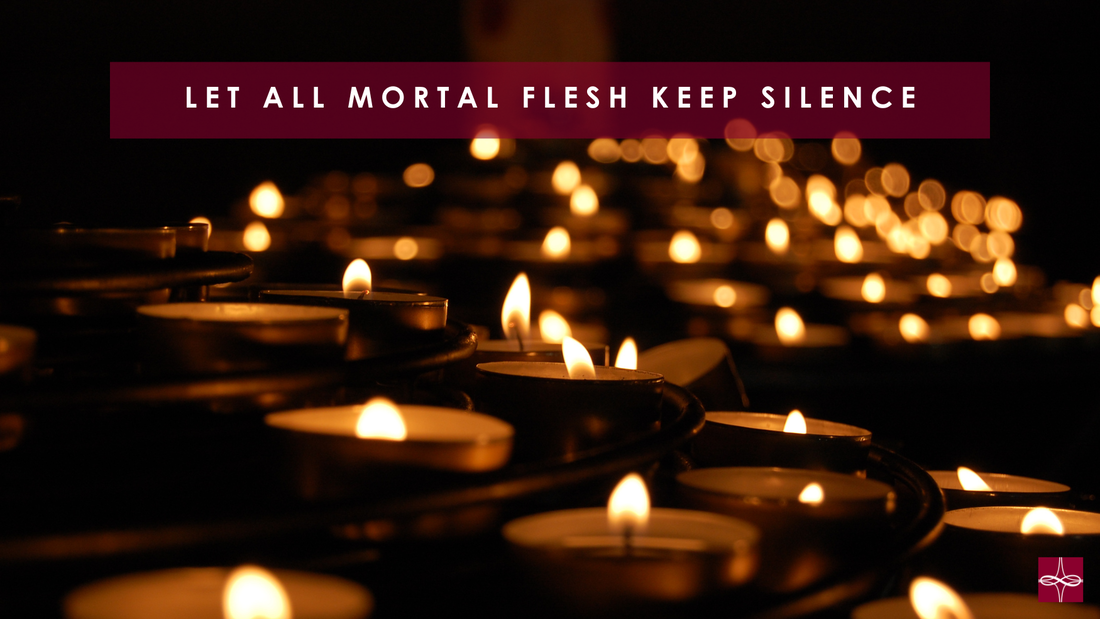

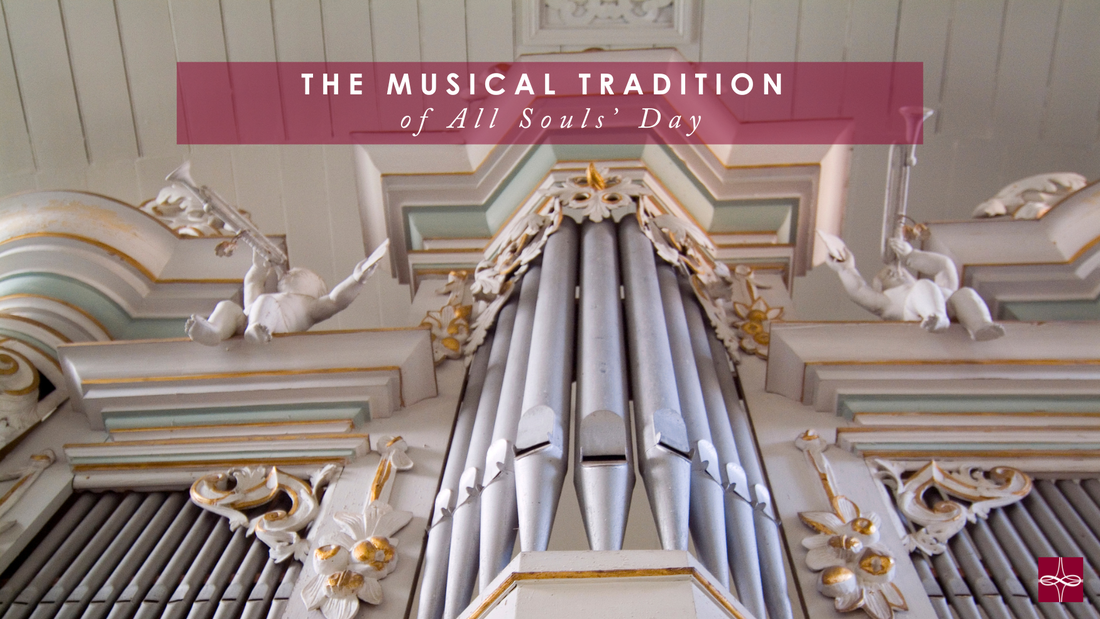

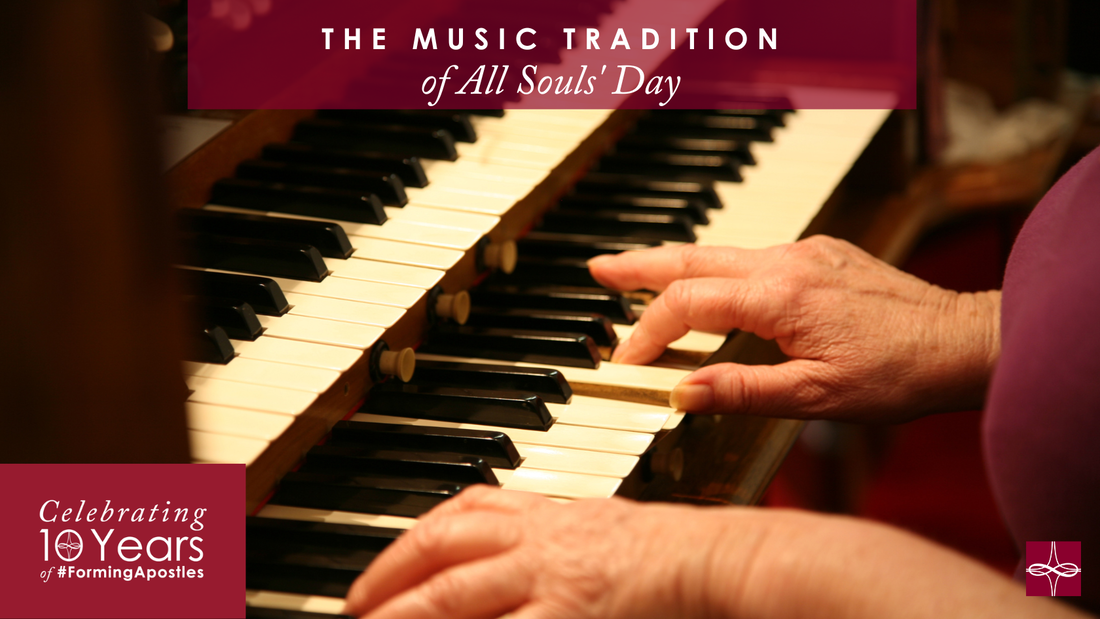



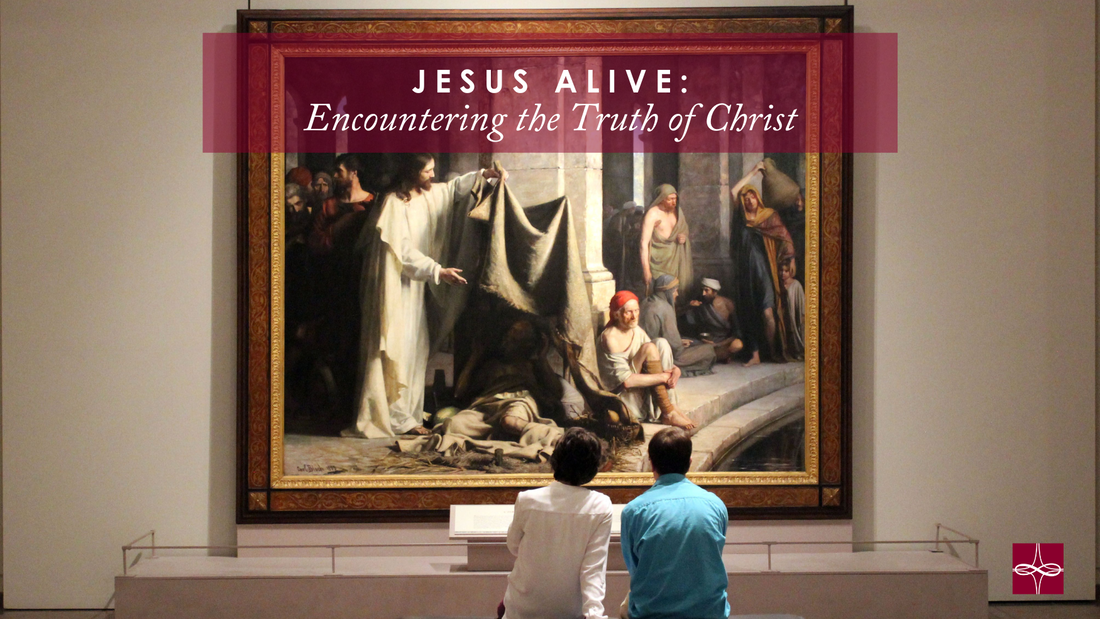

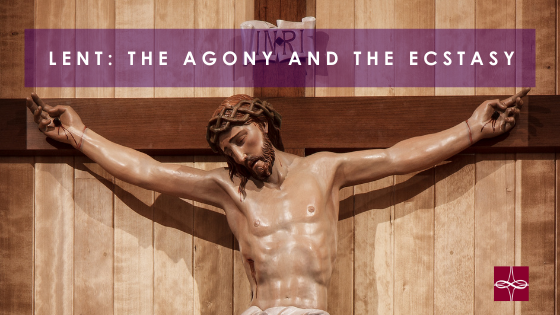



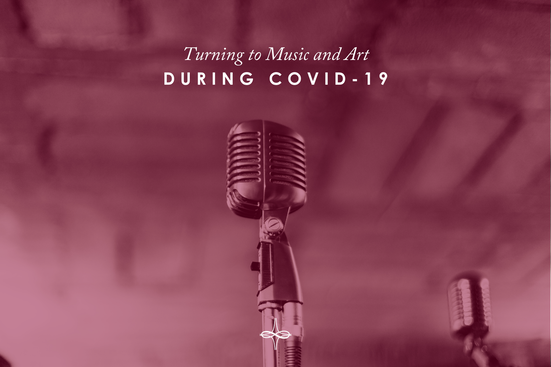

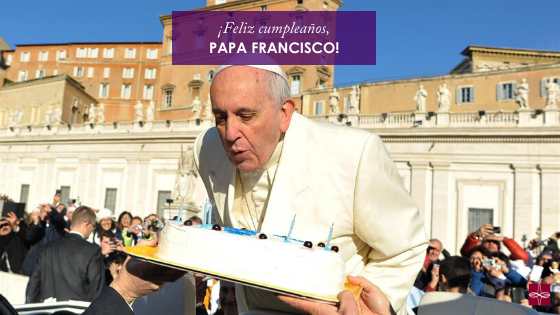

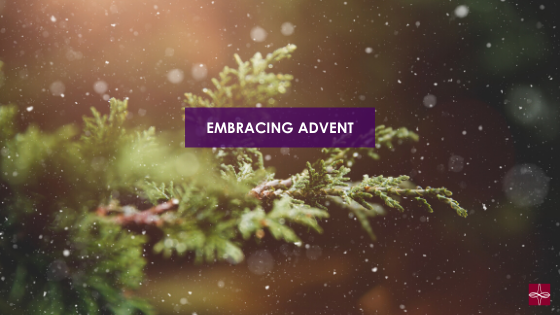

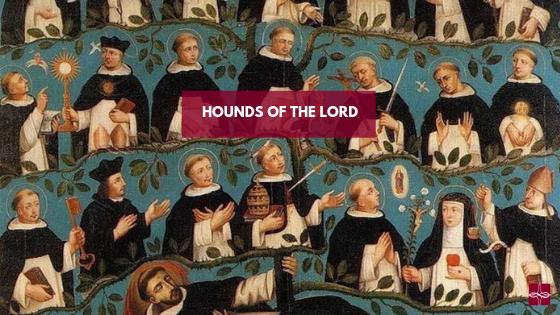



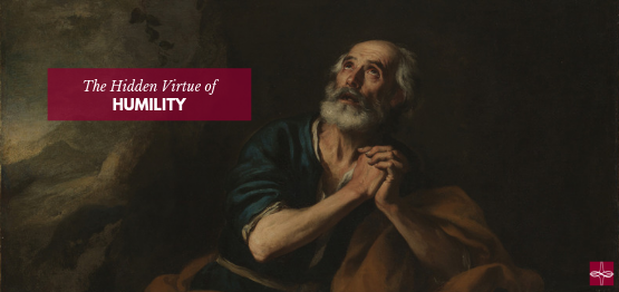

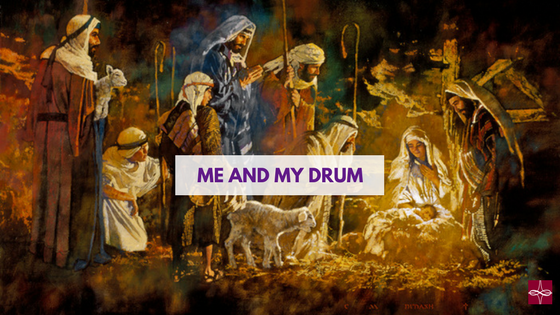

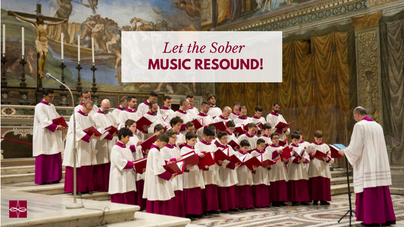

 RSS Feed
RSS Feed